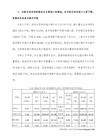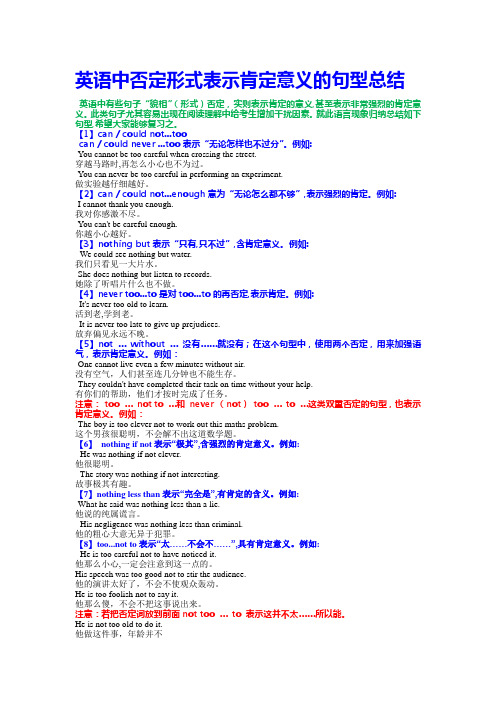高三英语——看似否定句实为肯定的11个句型
- 格式:doc
- 大小:265.00 KB
- 文档页数:3


这些「否定」句式,其实是「肯定」的含义有些英语句子不可望文生义,它们明明看起来是否定形式,有时却可以表示肯定的意义,甚至表示非常强烈的肯定意义。
由此,语言的神奇妙用被体现得淋漓尽致。
本文对这一有趣的语言现象进行了归纳总结,以下内容来自网络。
1. can / could not...too 表示“无论怎样也不过分”。
•You cannot be too careful when crossing the street. 穿越马路时,再怎么小心也不为过。
•You can never be too careful in performing an experiment. 做实验越仔细越好。
2. can / could not...enough 意为“无论怎么都不够”,表示强烈的肯定。
•I cannot thank you enough. 我对你感激不尽。
•You can’t be careful enough. 你越小心越好。
3. too...not to 表示“太……不会不……”,具有肯定意义。
例如:•He is too careful not to have noticed it. 他那么小心,一定会注意到这一点的。
4. never too...to 是对too...to的再否定,表示肯定。
例如:•It’s never too old to learn. 活到老,学到老。
5. not...for nothing中,not用来否定for nothing,从而加强了谓语的肯定意义。
例如:•He didn’t study law for nothing. 他学法律并没有白费。
•Believe me, he did not fly into such a rage for nothing. 请相信我,他勃然大怒是有原因的。
6. nothing if not 表示“极其”,含强烈的肯定意义。
例如:•He was nothing if not clever. 他很聪明。


英语中否定形式表示肯定意义的句型总结英语中有些句子“貌相”(形式)否定,实则表示肯定的意义,甚至表示非常强烈的肯定意义。
此类句子尤其容易出现在阅读理解中给考生增加干扰因素。
就此语言现象归纳总结如下句型,希望大家能够复习之。
【1】can / could not...toocan / could never ...too表示“无论怎样也不过分”。
例如:·You cannot be too careful when crossing the street.穿越马路时,再怎么小心也不为过。
·You can never be too careful in performing an experiment.做实验越仔细越好。
【2】can / could not...enough意为“无论怎么都不够”,表示强烈的肯定。
例如:·I cannot thank you enough.我对你感激不尽。
·You can't be careful enough.你越小心越好。
【3】nothing but表示“只有,只不过”,含肯定意义。
例如:· We could see nothing but water.我们只看见一大片水。
·She does nothing but listen to records.她除了听唱片什么也不做。
【4】never too...to是对too...to的再否定,表示肯定。
例如:It's never too old to learn.活到老,学到老。
It is never too late to give up prejudices.放弃偏见永远不晚。
【5】not …without …没有……就没有;在这个句型中,使用两个否定,用来加强语气,表示肯定意义。
例如:·One cannot live even a few minutes without air.没有空气,人们甚至连几分钟也不能生存。

英语⾥有的句⼦虽然⽤了否定词(或词组),但并不表⽰否定意义。
例如:you canno
t praise her too highly.这句虽然⽤了cannot,但意义却是肯定的,即"你怎么赞扬她都不过分。
"
英语⾥形式否定,实际肯定的句⼦常见的有如下⼏种。
1.由nothing(⽐如nothing but,nothing except,nothing beyond,nothing besides,nothing like,nothing short of,nothing if not等)构成的句⼦.例如:
i did nothing but press the button.我只是按了按电钮.
nothing but socialism can save china.只有社会主义才能救中国.
he did nothing except(or beyond) writing the letter.他只写了这封信.
i care for nothing besides this one.我只要这⼀个.
there is nothing like blue serge for men’s wear.蓝⾊哔叽最适合于男⼦穿.
there is nothing like jogging as a means of exercise.锻炼⾝体的办法是跑步
.
his escape was nothing short of a miracle.他的逃跑科可以说是个奇迹.
the plan is nothing short of revolutionary.这个计划完全是⾰命性的.。

透视中学英语中用否定搭配表示肯定含义的多种情况我们在学习英语的过程中,常常发现一种特殊现象,有些结构或句型在形式上是否定,却表示肯定意义。
这类句型在英汉互译、补全句子和阅读理解题中常常出现。
为了便于同学们学习,现归纳如下:一、“否定词+bu t…”表示肯定意义(1)“n o…but…”意为“都……,没有……不……”。
1.There is no man but has his faults. 人皆有过。
2.No one believes but she will succeed. 人们相信他会成功。
3.There is no one but knows him. 人人都认识他。
(2)“never (not)…but (that)”意为“每当……,总是……,没有哪次不是……”;“no t…bu t…”意思是“不是……而是……”,否定前者,肯定后者,连接句中相同成分。
1.I never see you but I think of my mother. 每当看见你时,我总是想起我的母亲。
2.It never rains but it pours.每次下雨都是倾盆大雨。
3.He will not be angry but that he is offended. 人们惹了他他才会生气。
4. Not Jim but Mike is on duty today .今天值日的不是吉姆而是迈克。
(3)“nothing but /none bu t…”意为“仅仅,只,只有……才”。
1.We can see nothing but water.我们只能看见水。
2.The boys want to do nothing but play football.男孩们只想踢足球。
3.None but me knew what happened. 只有我知道发生了什么事情。
4.There is no smoke without fire. 有烟必有火。
英语改为肯定句的方法
将英语句子改成肯定句的方法主要有以下几种:
1. 添加助动词:将句子中的动词改为肯定形式,例如将动词
be变为is/are/am,将动词do变为does,将动词have变为has 等。
例句:He is not happy.(他不快乐)→ He is happy.(他快乐)
2. 变换动词的形态:将句子中的动词从否定形式变为肯定形式,例如将动词的过去分词形式改为一般过去式,将动词的现在分词形式改为一般现在时等。
例句:I haven't seen him.(我没见过他)→ I saw him.(我见过他)
3. 改变句子结构:调整句子中不完整的结构或者改变否定词的位置,使句子成为肯定形式。
例句:There isn't any water left.(不剩下任何水了)→ There is still some water left.(还剩下一些水)
4. 使用肯定形容词或副词:将句子中的否定形容词或副词改为肯定形式。
例句:She is not beautiful.(她不漂亮)→ She is beautiful.(她
漂亮)
需要注意的是,以上方法只适用于将否定句改为肯定句,而对于疑问句的改写,需要根据具体情况进行调整。
表面否定实际上肯定之句型汇总一、…hardly…when/before…… scarcely … when…一…就…… no sooner … than …1、He had hardly arrived when/before she started complaining.==Hardly had he arrived when/before she started complaining. 他刚一到达,她就开始抱怨2、He had scarcely gone out when it began to rain.==Scarcely had he gone out when it began to rain. 他刚一出去,天就开始下雨。
3、The sun had no sooner started to shine than it was clouded over again.==No sooner had the sun started to shine than it was clouded over again. 太阳刚露脸,又马上乌云密布了。
二、…not … until…直到…才…1、I didn’t reach the station until after the train had left. 我直到火车离开才到达火车站。
2、But as a matter of fact, I did not begin work until he had gone.事实上我直到他离开,我才开始工作。
三、…nothing but /except…除了,只不过。
1、Don’t have him for a friend, he ‘s nothing but /except a criminal.不要把他当作朋友,他只不过是个犯人。
2、Entering the room, we saw nothing but / except a desk there.一走进房间却只看到一张桌子。
英语中否定表达肯定的句子1. 英语中的肯定(否定)句怎样改肯定句变否定句的基本方法1. 动词be的否定式动词be根据不同的人称和时态可以有am, is, are, was, were等不同形式,可用作连系动词(表示“是”、“在”等)和助动词(用于构成进行时态和被动语态等),但不管何种情况,构成否定式时,一律在其后加not:I'm old, but you're young. 我老了,但你还年轻。
→I'm not old, but you're not young. 我还不老,但你不年轻了。
He was reading and I was writing. 他在读,我在写。
→He was not reading and I was not writing. 他没有在读,我没有在写。
2. 动词have的否定式动词have根据不同的人称和时态可以有have, has, had等形式,可以用作实意动词和助动词,分以下情况讨论:1.用作实意动词表示状态,如表示拥有、患病或用于have to表示“必须”等,在构成否定式时可以直接在其后加not,也可根据情况在其前使用don't, doesn't, didn't:He has a car. 他有辆小汽车。
→He hasn't a car. / He doesn't have a car. 他没有小汽车。
He had some dictionaries. 他有一些词典。
→He hadn't any dictionaries. / He didn't have any dictionaries. 他没有词典。
You have to go with him. 你必须同他一起去。
→You haven't to go with him. / You don't have to go with him. 你不必同他一起去。
掌门1对1教育高中英语
高三英语——看似否定句实为肯定的11个句型
大家在学习英语的过程中,想必会发现一种特殊现象:一些形式上看似否定句的句型,实际上却表示肯定意义。
为便于大家学习,现归纳如下:
1. nothing (或no + 名词)but …只有;仅仅Nothing (或no + 名词)but …等于only ,表示肯定意义,后接名词、代词、不定式等。
例如:
No one but him in our class can swim across the river. 在我们班上,只有他能游过这条河。
She could do nothing but wait here. 她只好在这时等,别无他法。
2. not …without …没有……就没有
在这个句型中,使用两个否定,用来加强语气,表示肯定意义。
例如:
One cannot live even a few minutes without air. 没有空气,人们甚至连几分钟也不能生存。
They couldn't have completed their task on time without your help. 有你们的帮助,他们才按时完成了任务。
注意:too …not to …和never (not)too …to …这类双重否定的句型,也表示肯定意义。
例如:
The boy is too clever not to work out this maths problem. 这个男孩很聪明,不会解不出这道数学题。
3. not …until …直到……才……
在这个句型中,until 可作介词,也可作连词。
作介词时,后接名词、代词或短语;作连词时,后接句子。
not 后面接非延续性动词。
例如:
The bus didn't leave until all the seats were taken. 直到车上坐满了乘客,汽车才开走。
not …until …也可用于强调句型和倒装句式中。
例如:
It was not until this morning that he finished the work. 直到今天上午,他才完成那项工作。
4. hardly / scarcely …when …一(刚)……就……
在这个句型中,when 是并列连词,其前面的句子要用过去完成时,其后的句子用一般过去时。
例如:
He had hardly/scarcely arrived when it began to rain. 他一到天就开始下雨了。
5. no sooner …than …一(刚)……就……
在这个结构中,no sooner 位于主句中,主句用过去完成时,than 引导状语从句,从句用一般过去时。
例如:
No sooner had they got to the theatre than the concert began. 他们刚跨进剧院,音乐会就开始了。
6. can + not + be + 形容词+ enough/can not + 动词原形+ too much (highly )越……越好;无论怎样也不过分
在这个句型中,not 可用never 来替代。
例如:
He is a hero. We can not praise him too much (highly)。
他是英雄,我们无论怎样赞扬他也不过分。
7. have never + 过去分词+ 比较级最……;再没有比……更……
该句型从反面表示“最……”的概念。
例如:
We have never seen a more interesting film than this one = This is the most interesting film that I have ever seen. 这部电影是我们看过的最有趣的影片。
8. can't (help)but …只好;不得不;必然
在这个结构中,help 可省略,but 后面接不带to 的不定式。
例如:
He can't (help)but admit that he was wrong. 他只好承认自己是错了。
9. can' 't help doing sth. 情不自禁地做某事Hearing the joke,we couldn't help laughing. 听了这个笑话,我情不自禁地笑了起来。
10. not + 含否定意义的词缀的词(不时不)。
例如:
It is not uncommon for a great scholar to be ignorant in everyday affairs. 一个伟大的学者,对日常事务无知,这种情况并不罕见。
11. 用表示赞叹的否定疑问句来表示肯定意义。
例如:
Isn't the film wonderful?多么好的一部影片啊!。